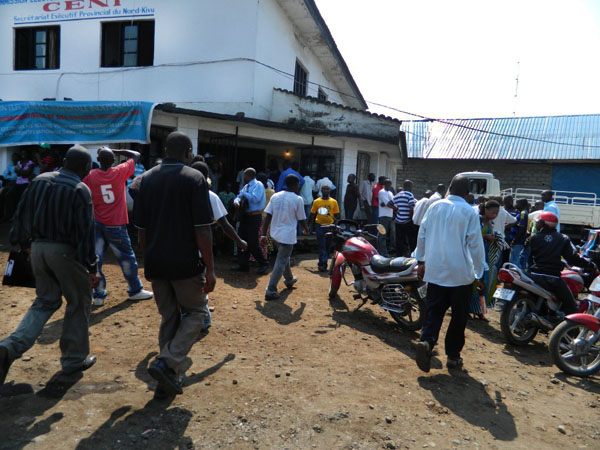
BUKAVU/GOMA, Democratic Republic of Congo — Final preparations are underway in eastern Congo for the elections, now just days away. The National Independent Electoral Commission, known by its French acronym CENI, is ardently posting ballot papers, giving accreditations to political parties’ witnesses and independent observers, printing new voter cards for those who lost them, and setting up ballot boxes. It is also sorting out how to handle ghost polling stations and settling claims by voters whose names have gone missing from polling lists.
Complaints have arisen across North and South Kivu about incomplete voter registration lists. Civil society has reported that people in remote areas such as Idjwi Nord, an island in Lake Kivu, raised their voice when the names of about 20,000 eligible voters didn’t appear on the list at a polling station, when 42,500 people had registered to vote. Similarly, in Pinga, in Walikale territory of North Kivu, civil society reported the disappearance of about 2,550 names from the voting list.
Further adding to the frustration are the missing polling stations that were supposed to be set up by CENI. In Bamuguba and Baliga in Shabunda territory of South Kivu, civil society held a peaceful demonstration last week, claiming that only four out of 27 polling sites had been set up. The lack of sufficient polling stations in these two localities could lead to the exclusion of 32 percent of registered people in the area, according to estimates by the U.N.’s Radio Okapi.
Over the last several days, Bukavu has played host to the main contenders among the 11 presidential candidates.
Shortly after incumbent President Joseph Kabila and his main contender Etienne Tshisekedi visited the town, candidate Leon Kengo Wa Dondo, president and founder of the Union des Forces du Changement, or UFC, arrived. He gave his speech in Lingala, one of the four national languages, which is not widely spoken in eastern Congo. Accordingly, not many people came to listen to him. Ending the violence in eastern Congo was one of his main promises:
Give me the opportunity and I will be “Lula” for the DRC. I very well know how much you, the people of eastern Congo, have suffered and it is time to end insecurity once and for all. When I become president, I will make sure there is no more rape against women in the eastern Congo; there will be justice and no more impunity. Your children will attend elementary and secondary school for free. I will also make every effort to address the issue of the armed group, FDLR, until they all go back to their home country.
Early this week, cheering crowds welcomed Vital Kamerhe, who hails from South Kivu. He is the former president of the National Assembly under President Kabila and founder and president of the Union pour la Nation Congolese, a main opposition party. Along the road from the Bukavu’s Kavumu airport to the town center, masses of people gathered to get a glimpse of Kamerhe and hear him speak. Thousands of people awaited his arrival and listened to his two hour-long speech in pouring rain at the Palace de l’Independence. A key quote from his remarks:
I have traveled across the whole country and realized that it has everything; it only needs good leadership and good governance to make sure the country’s wealth benefits each and every single Congolese. Our country is not only rich in minerals, but also in arable land, but still people are hungry. (…)
If you vote for me to become president, I will focus on three areas: Rebuilding our failed state, making sure good governance and accountability are set in place, and improving living conditions for all Congolese. I will also make sure the army and the police, and teachers, will not be left behind; they have to get paid on a regular basis. I will also make sure everyone, the rich and the poor, have equal access to justice. We will all fight impunity.
Kamerhe went on to say that in a context of a failed state like Congo, the leaders do not need to just address the problems, but focus on the root causes. He had this to say about the challenges in the East:
Today, we are facing conflict centered on minerals and if nothing gets done, tomorrow, it will be a different crisis centered on water. The country has about 110 varieties of mineral substances. I decided to leave president Joseph Kabila’s government because of the poor contract he signed with GREC, the Chinese group of enterprises, to create joint ventures and to not keep his promises. The contract does not really benefit the local populations. I will make sure to put in place mechanisms to control the minerals trade and ensure traceability. If we do not know where the minerals are coming from and where they are going to, we will always face interminable conflicts.
The supporters of Kamerhe, along with those of the MLC, the political party of Jean Pierre Bemba Gombo, Enough spoke to at the end of the meeting said they were one hundred percent sure their respective candidates would win the election, unless Kabila played tricks. On the other hand, Joseph Kabila’s supporters told me that Kamerhe, Tshisekedi, and other candidates should stop dreaming that they would win.
While the candidates are continuing to campaign, the question of whether post-election violence is preventable has been raised. The national, regional, and international key monitors and policymakers must be actively involved in supporting CENI, to make sure the election will be transparent, and to hold all candidates responsible once the election results are announced on December 6.
Fidel Bafilemba contributed to this post.
Photo: A crowd gathers at a CENI office in Goma to protest missing names on the voter lists (Enough/Fidel Bafilemba)

